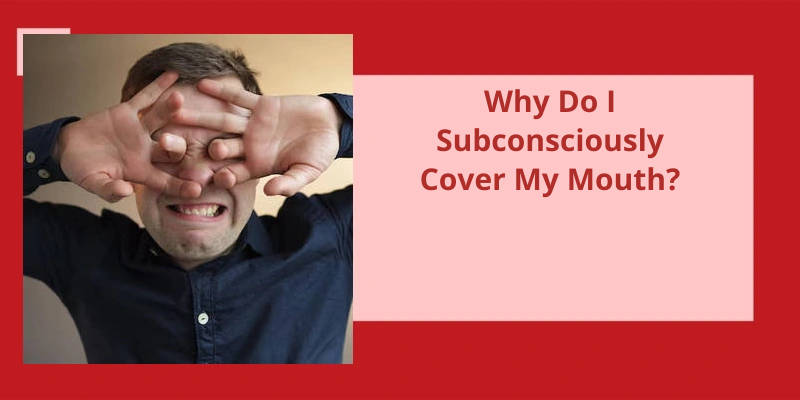"Why do I subconsciously cover my mouth?" This question may arise when we notice ourselves engaging in the seemingly automatic and instinctual action of covering our mouths in certain situations. From a young age, we’re often told to cover our mouths when we cough, yawn, or laugh loudly. However, this tendency to cover the mouth goes beyond mere hygiene or manners. It’s also a way of concealing our emotions from others, to avoid showing that we’re afraid, shocked, or disgusted. Many experts say that this response is learned as a form of politeness, but, interestingly enough, this behavior is seen across various different cultures. By exploring the reasons behind this behavior, we can gain a better understanding of ourselves and the universal aspects of human communication.
Why Would a Guy Cover His Mouth?
It can also be a sign of embarrassment or shame. When someone covers their mouth, they may be trying to hide their emotions or thoughts from others. This gesture can serve as a form of self-protection, as individuals may subconsciously feel the need to shield themselves from judgment or criticism.
Moreover, covering the mouth can be a reaction to surprise or shock. When faced with unexpected news or events, individuals may instinctively bring their hands to their mouth in a protective gesture. This can stem from a deeply ingrained instinct to shield oneself from potential harm or danger.
Another possible reason for covering the mouth is to prevent the spread of germs or unwanted odors. In certain cultures or societies, it’s considered polite to cover the mouth when coughing, sneezing, or yawning. This behavior demonstrates respect for others and shows awareness of personal hygiene.
Overall, the act of covering ones mouth can have multiple interpretations and can vary depending on the context and individual. It can signal a range of emotions such as stress, embarrassment, anxiety, surprise, or a desire for self-protection. Understanding the underlying meaning often requires further observation and consideration of the specific circumstances and the persons body language as a whole.
Gestures as a Form of Personal Hygiene: Exploring the Cultural Norms and Practices Around Covering the Mouth During Coughing, Sneezing, and Yawning.
- Using hand to cover the mouth while coughing
- Using hand to cover the mouth while sneezing
- Yawning with hand covering the mouth
- Practicing these gestures as personal hygiene measures
- Considering cultural norms and practices
- Respecting cultural differences and preferences
- Understanding the importance of preventing the spread of germs
- Implementing these gestures in daily routines
- Creating a healthy and hygienic environment
While covering one’s mouth while chewing may seem like a common courtesy, the reasons behind this behavior can vary from person to person. Some individuals may do so to avoid the embarrassment of having bits of food visible on their lips, while others may cover their mouths if they’ve bad or no teeth. Additionally, it could simply be a personal preference for those who feel they’ve taken too big a bite or wish to prevent the possibility of food accidentally spewing onto someone else.
Why Do Some People Cover Their Mouth When They Chew?
Why do some people have the subconscious tendency to cover their mouth when they chew? This peculiar behavior can stem from various underlying reasons. One possibility is the desire to shield others from witnessing bits of food lingering on their lips. It’s a way of ensuring cleanliness and avoiding potential embarrassment. Another reason might be linked to the slight opening of the mouth while drinking. By instinctively covering their mouth, individuals may unintentionally prevent any liquid from escaping and splattering on others.
Another explanation for this behavior could involve dental issues. Individuals with bad or missing teeth may feel self-conscious about their appearance while eating or drinking. As a result, they may subconsciously cover their mouth, trying to conceal any physical insecurities. In some cases, it could simply be a matter of personal habit or preference. Certain individuals might feel uncomfortable with the idea of having too much food in their mouth, fearing they might spew half-chewed food onto the people around them.
Influence of Personal Hygiene Practices: Investigate if Individuals Who Cover Their Mouth While Chewing Prioritize Personal Hygiene and Cleanliness. Explore if This Behavior Aligns With Other Personal Hygiene Habits and Rituals.
- Observe individuals’ behavior when chewing food
- Take note of whether they cover their mouth while chewing
- Ask participants about their personal hygiene practices
- Explore other personal hygiene habits and rituals
- Compare the results to determine if there’s a correlation
- Analyze the data to draw conclusions about prioritization of personal hygiene
This cultural practice of covering the mouth in East and Southeast Asia is deeply rooted in traditional etiquette. While Western cultures often associate a wide smile with happiness and sincerity, the idea of concealing teeth while expressing joy is considered more polite in these regions. It’s fascinating to explore the cultural nuances and understand why such practices differ around the world.
Why Do Some People Cover Their Mouth When They Smile or Laugh?
Why do some people cover their mouth when they smile or laugh? It’s a cultural habit that can be traced back to traditional etiquette in various regions. In Chinese culture, for example, there’s a long-standing belief that when women smile or laugh, their teeth shouldn’t be visible. As a child, I was taught to cover my mouth when I smiled or laughed, as it was seen as more polite and modest. This practice isn’t limited to China, but is also common in many other East and Southeast Asian countries.
By concealing ones teeth, it allows individuals to preserve a certain level of anonymity and keeps their emotions guarded. In some cultures, expressing emotions too openly can be seen as inappropriate or even vulgar. By covering the mouth, individuals are able to control the level of emotion they display, and maintain a sense of composure in social settings.
The Potential Health Benefits or Drawbacks of Covering the Mouth When Smiling or Laughing, Such as Dental Hygiene or the Spread of Germs
Covering the mouth when smiling or laughing can have potential health benefits. It helps to prevent the spread of germs and decrease the transmission of infectious diseases. Additionally, it can contribute to maintaining dental hygiene by protecting the teeth from exposure to bacteria present in the air. However, covering the mouth excessively or subconsciously can also have drawbacks. It may cause the accumulation of moisture around the mouth, creating an environment favorable for bacteria growth. Additionally, it may hinder effective communication and expression, as facial expressions are an important part of nonverbal communication.
Why Do I Cover My Mouth With My Hand?
People may perceive you as lacking confidence or being unsure of yourself. It can create a barrier between you and your audience, hindering effective communication. Others might find it unprofessional or disrespectful, especially in certain cultural contexts.
There are several theories as to why people exhibit this subconscious behavior. One possibility is that covering the mouth serves as a self-soothing mechanism, providing a sense of comfort or security during moments of anxiety or stress. It can also act as a form of protection, shielding the speaker from potential judgment or criticism.
Additionally, covering the mouth with the hand could be a learned behavior. People often observe others engaging in this action, such as parents or authority figures, and unconsciously mimic it. This mirroring can become ingrained in our behaviors, even if we’re unaware of it’s origin.
If you find yourself repeatedly covering your mouth while speaking, it can be helpful to increase your self-awareness. Pay attention to the situations or circumstances in which you catch yourself doing this, and try to identify any underlying emotions or triggers. Developing alternative coping mechanisms, such as deep breathing or grounding techniques, can help address any anxiety or stress that may be contributing to this habit.
Finally, it may be beneficial to seek professional help if covering your mouth becomes an excessive or disruptive behavior. A therapist or speech-language pathologist can work with you to identify the root causes and provide strategies to overcome this habit, ultimately improving your communication skills and overall confidence.
How to Overcome the Habit of Covering the Mouth
- Practice regular self-awareness
- Replace the habit with a positive alternative
- Use reminders and cues
- Isolate triggers and avoid them
- Seek support from friends or family
- Set achievable goals
- Practice relaxation techniques
- Redirect thoughts and focus on positive behaviors
- Reward yourself for progress made
- Seek professional help if needed
Source: ELI5
Mouth taping involves covering the mouth with adhesive tape during sleep, which encourages nasal breathing and helps promote better overall sleep quality. This technique has gained some popularity among individuals who experience difficulties with mouth breathing during the night. By focusing on nasal breathing, mouth taping aims to alleviate symptoms associated with chronic oral ventilation and improve sleep patterns.
Why Do I Like to Cover My Mouth When Sleeping?
The act of covering ones mouth while sleeping is often subconscious and can serve various purposes. One possible reason is related to breathing habits. Some individuals unconsciously cover their mouth because they’re mouth breathers. Mouth breathing, medically known as chronic oral ventilation, occurs when there’s an obstruction to breathing through the nose. This obstruction may be due to allergies, nasal congestion, or structural abnormalities in the nasal passages. When these individuals sleep, they naturally rely on breathing through their mouth, prompting them to cover it in an attempt to maintain a steady airflow.
Covering the mouth during sleep might also help alleviate certain issues associated with mouth breathing. One of the common problems related to chronic oral ventilation is a dry or scratchy throat. By covering the mouth, individuals create a barrier that prevents excessive moisture loss from the respiratory system, helping to combat throat dryness. Additionally, mouth breathing can result in bad breath due to decreased production of saliva, which acts as a natural mouth cleanser. Covering the mouth can reduce the evaporation of saliva, potentially mitigating the issue of halitosis.
Snoring is often a consequence of mouth breathing and occurs when there’s a partial blockage of the airway. By covering the mouth, individuals may find relief from snoring, as it encourages them to breathe through their nose instead. Nasal breathing promotes better airflow, reducing the likelihood of snoring and potentially leading to a more restful sleep.
In some cases, individuals may intentionally tape their mouths during sleep as a method known as mouth taping. This practice assists in training individuals to breathe through their noses, improving their overall respiratory function and sleep quality. By securing the mouth with tape, one can reinforce nose breathing, retrain the muscles involved in respiration, and encourage better breathing habits over time.
Consulting a healthcare professional can help determine the exact reasons for mouth breathing and enable individuals to explore appropriate treatments, such as nasal sprays, allergy medications, or corrective surgeries, if necessary.
Strategies to Encourage Nasal Breathing During Sleep
- Incorporate breathing exercises before sleep
- Practice diaphragmatic breathing during the day
- Avoid sleeping on your back
- Use nasal strips or dilators to keep the nasal passages open
- Keep the bedroom environment clean and free from allergens
- Use a humidifier to add moisture to the air
- Avoid smoking and exposure to secondhand smoke
- Elevate the head of the bed to reduce nasal congestion
- Avoid consuming alcohol or sedatives close to bedtime
- Consider using nasal irrigation techniques
Conclusion
It not only acts as a protective measure against potential threats by concealing our vulnerable facial expressions, but it also functions as a way to display politeness and respect in certain situations. Moreover, this pervasive gesture transcends cultural boundaries, suggesting that it’s deep roots within our collective human experience. So, the next time you find yourself instinctively covering your mouth, consider the multitude of underlying factors that may be at play, shaping our nonverbal communication and revealing insights into our complex human nature.






